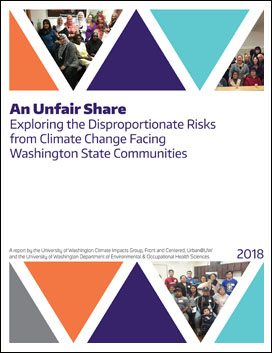LOCAL
Report: Vulnerable communities face greater climate change risks
The following is from Front and Centered:
SEATTLE (Aug. 17, 2018) — Everyone in Washington state will be affected by climate change, but race, income and occupation influences how much risk Washington state residents and workers face from climate-related hazards like wildfires, floods and extreme heat. A new report finds that the state’s most vulnerable people are often communities of color, indigenous people and lower-income communities.
 “Climate change is a global issue, with specific local impacts. Who you are, where you work and where you live are all critical factors in how you experience the impacts of climate change and the risks you face,” said Heidi Roop, Research Scientist at the University of Washington Climate Impacts Group who co-authored the report.
“Climate change is a global issue, with specific local impacts. Who you are, where you work and where you live are all critical factors in how you experience the impacts of climate change and the risks you face,” said Heidi Roop, Research Scientist at the University of Washington Climate Impacts Group who co-authored the report.
The new report describes the potential health impacts of climate change and explores a range of factors that result in greater vulnerability for Washington communities such as race/ethnicity, income, language and health status. The report is a collaboration between Front and Centered, a climate justice coalition of more than 60 community-based groups across Washington, the University of Washington’s Climate Impacts Group, Urban@UW and the University of Washington’s Department of Environmental & Occupational Health Sciences.
The report was informed by community listening sessions held across the state, where community members described their experiences and concerns about climate change and environmental pollution. The listening sessions were organized by Front and Centered.
“This report highlights the kinds of concerns that people already have in our community,” said Rosalinda Guillen, Executive Director of Community to Community Development. “As farmworkers in Whatcom and Skagit counties, we are at great risk for climate impacts right now, with working conditions that include extreme heat, poor air quality and fewer rights to protect our health. We lost our brother Honesto Ibarra last year to these factors. But we are also creating the solutions, organizing workers for safer workplaces and advancing solutions to slow climate change and protect communities.”
The report highlights key issues for Washington state communities:
- With high temperatures on our hottest days in the Puget Sound region projected to be as much as 10°F warmer by the end of this century, those who work in agriculture, construction and other outdoor professions, many of whom are people of color, will be exposed to more extreme conditions that pose significant health risks.
- As sea levels rise and extreme rainfall becomes more intense, communities that live near coasts or rivers, including lower-income residents who are less able to recover from such events, will be increasingly exposed to severe flooding and coastal hazards.
- As warming continues and wildfire potential increases, there will be greater risks to home and health for residents in areas prone to wildfire. The ability to respond to these climate hazards is directly tied to factors like income, health status, race/ethnicity, and language.
- Given the placed-based nature of climate change-related risks, community members are likely to be the experts in developing and deploying solutions that bolster community resilience to climate change.
This collaborative report was made possible with support from Seattle Foundation, which recently launched its Climate Justice Impact Strategy to ensure that communities of color and low-income communities lead and shape efforts to reduce the disproportionate effects of climate change they experience.
“While climate change affects all of us, we need to center our efforts around those most impacted – communities of color and low-income communities,” said Sally Gillis, managing director at Seattle Foundation. “This report brings together community perspectives with academic research to advance solutions to our most critical challenges.”
The project partners hope the report will spark new research on climate and equity to fill key knowledge gaps, such as the costs associated with climate impacts on underserved communities. They hope it can support community-based efforts to develop solutions and increase resilience to climate impacts for those on the frontlines.





